
In the fast-paced world of ecommerce, where new stores pop up all the time, standing out is not just an advantage—it’s a necessity. If you’ve ever wondered how some online stores seem to effortlessly climb the search engine ranks while others are stuck in the digital doldrums, the answer often lies in one of SEO’s most powerful tools: link building.
Now, you might be thinking, “Isn’t link building old news?” Well, yes and no. While link building has been around for a while, it’s far from outdated. In fact, as Google’s algorithms evolve and competition in the ecommerce space heats up, link building has only grown more crucial. But here’s the catch: it’s not just about getting any links; it’s about getting the right links.
In this guide, we’re going to break down why link building is still vital for ecommerce SEO in 2024. We’ll explore the benefits of building a strong link profile, dive into the strategies that actually work, and share tips that will help your ecommerce store grow. Whether you’re a seasoned SEO pro or just getting started, you’re in the right place.
Ready to take your ecommerce store to new heights? Let’s get linking!
The Role of Link Building in Ecommerce SEO
1. Boosting Domain Authority and Page Rank
Imagine your ecommerce website as a contestant in a popularity contest. In this contest, the judges are search engines like Google, and they’re keeping a close eye on who’s talking about you. When other websites link to your content, it’s like they’re vouching for you, telling the judges, “Hey, this site knows what it’s talking about!” These backlinks are the votes of confidence that can significantly boost your domain authority.
Higher domain authority makes your site more likely to rank well on search engine results pages (SERPs). But it’s not just about quantity; quality matters too. A single backlink from a highly respected site in your niche can do more for your page rank than dozens of low-quality links. It’s like getting an endorsement from a celebrity versus a random passerby—the former carries a lot more weight.
2. Increasing Organic Traffic
When your domain authority and page rank improve, the benefits don’t stop there. As your website climbs higher in search results, it becomes more visible to potential customers searching for the products you sell. This increased visibility translates directly into more organic traffic—visitors who find your site naturally through search engines rather than paid ads or social media.
3. Enhancing Brand Visibility and Credibility
In the crowded marketplace of ecommerce, establishing your brand as a trusted authority is key. Quality backlinks from reputable sources not only boost your SEO but also position your brand as a credible player in your industry. When customers see your site being linked to by well-known websites or influencers, it reinforces the idea that your brand is trustworthy and worth their time and money.
Think of it as a kind of digital word-of-mouth. Just as you’re more likely to trust a restaurant that your friends rave about, potential customers are more likely to trust a brand they see being recommended by reputable websites. Over time, this enhanced credibility helps build long-term brand loyalty and customer trust.
4. Driving Referral Traffic
While the SEO benefits of link building are clear, there’s another perk that often flies under the radar: referral traffic. When someone clicks on a backlink from another site, they’re essentially being referred to your store. These referrals can be incredibly valuable because they come from an already interested audience.
For instance, if a popular fashion blog links to your ecommerce store’s latest collection, the readers who click through are likely fashion enthusiasts who are ready to shop. Not only does this increase the likelihood of making a sale, but it also helps you tap into new audiences that you might not reach through organic search alone.
And here’s a bonus: link building isn’t just about SEO. It’s also a great way to build relationships within your industry. When you collaborate with other websites, bloggers, or influencers, you’re not just gaining a backlink—you’re forging a connection that could lead to future partnerships, co-promotions, or even more backlinks down the road. So, while you’re boosting your site’s authority and driving traffic, you’re also growing your network.
13 Key Link Building Strategies for Ecommerce in 2024
1. Create Shareable Content
To attract quality backlinks, focus on creating content others want to link to. This could be detailed guides, infographics, or data-driven studies.
For example, if you sell eco-friendly products, you could create a comprehensive guide on sustainable living. This type of content can naturally attract backlinks from bloggers, news outlets, and eco-conscious websites.
Creating content for link building involves producing valuable and informative material that others want to link to. Focus on developing high-quality resources, such as comprehensive guides, industry reports, or engaging visuals, that provide real value to your audience. When your content is well-crafted and useful, it encourages others to link back to it, which enhances your SEO and drives more traffic to your site. The key is to offer content that stands out and meets the needs of those looking for reliable information.

2. Guest Blogging
Guest blogging is still a powerful tool for link building when done correctly. Identify authoritative blogs in your niche and pitch them unique content ideas. Make sure your guest posts offer real value to their audience while subtly integrating links back to your ecommerce site.
How to get started:
- Identify target blogs: Use tools like Ahrefs or SEMrush to find high-authority blogs within your niche.
- Send your emails: Send out an email to the relevant person who runs the blog (usually someone in marketing or the blog’s editor) and pitch them your idea.
- Craft a pitch: Personalise your outreach email.
Here’s an example template:
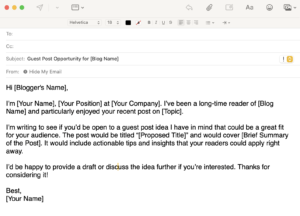
3. Collaborate with Influencers
Partnering with influencers who resonate with your brand can lead to valuable backlinks. Reach out to influencers who have a strong online presence and offer them products for review or collaborate on content that they can share with their audience, which in turn links back to your site.
How to execute:
- Research relevant influencers: Look for influencers who align with your brand values and have an engaged audience.
- Reach out: Provide a compelling reason for them to collaborate, such as exclusive access to new products or co-creating content like videos or blog posts.
Product reviews and unboxings by bloggers and influencers can be a significant source of backlinks. To leverage this, start by identifying influencers in your niche using tools like BuzzSumo or NinjaOutreach. Look for those with engaged audiences who frequently review products similar to yours.
Once you’ve identified potential influencers, reach out with a personalised email offering them your product for review. Here’s a sample email template you can use:
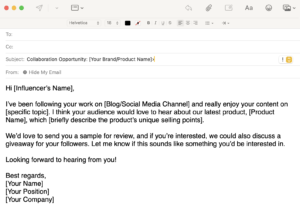
4. Skyscraper Technique
This strategy involves finding high-performing content in your niche and creating something even better. Once you’ve created your superior content, reach out to the sites that linked to the original piece and suggest they link to your improved version.
Step-by-step:
- Identify content: Use a tool like BuzzSumo to find content with lots of backlinks.
- Create superior content: Make sure your version is more comprehensive, updated, or visually appealing.
- Outreach: Find the right person in the company to reach out to and send your email.
Here’s an email template you can use:
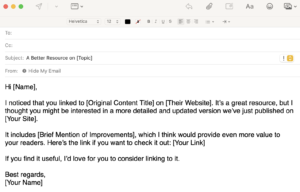
5. Broken Link Building
This technique involves finding broken links on websites in your niche and suggesting your content as a replacement.
Execution steps:
- Find broken links: Use tools like Ahrefs or Check My Links to find broken links on relevant websites.
- Create or identify replacement content: Ensure your content is relevant to the broken link.
- Reach Out: It’s time to contact the person who can help you get the broken link replaced with your own.
Here’s an email template for your outreach:
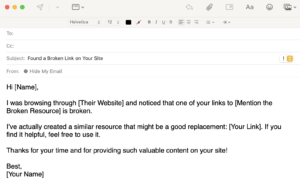
6. Try Out a Joint Ventures
Collaborating with complementary businesses in your niche can be a powerful way to build backlinks while expanding your reach. Here’s how to approach it:
- Identify potential partners: Look for businesses that align with your brand but aren’t direct competitors. For example, if you sell fitness equipment, partnering with a nutrition brand for a content piece on “Complete Fitness Routines” can be mutually beneficial.
- Pitch the idea: Craft a proposal outlining how the collaboration can benefit both parties. Offer to create a co-branded piece of content, such as an eBook, a blog post series, or even a webinar. Highlight how this collaboration can drive traffic and engagement for both brands.
- Content creation: Once agreed, work closely with your partner to create high-quality content. Ensure the content is informative, engaging, and aligned with both brands’ messaging.
- Promotion: Promote the content across both your channels, including email newsletters, social media, and blogs. Both brands should link back to the content, creating valuable backlinks.
7. Do a Giveaway or Contest
Giveaways are a tried-and-true method to increase engagement, attract potential customers, and build backlinks. They work particularly well in ecommerce because they incentivise participation with the promise of winning a product.
- Choose a relevant prize: The prize should be something your target audience values. It could be one of your best-selling products or a bundle of items.
- Partner up: Collaborating with another brand can increase the giveaway’s reach. Ensure your partner’s audience aligns with yours for maximum impact.
- Set the rules: To enter, participants could be required to visit your website, share the giveaway on social media, or sign up for your newsletter. Each of these actions can help generate backlinks, especially if the giveaway is hosted on a blog or landing page.
- Promote the giveaway: Promote the giveaway on your website, blog, social media, and through your partner’s channels. Encourage participants to share the giveaway link, further increasing your chances of gaining backlinks.

8. Submit to Niche Directories
Niche directories are online lists of businesses and resources within a specific industry. Submitting your site to relevant directories can provide a steady stream of traffic and, of course, a backlink.
Actionable tips:
- Find high-quality directories: Ensure the directories are reputable and relevant to your niche.
- Provide complete information: When submitting, make sure to include all relevant details, like your business name, address, and a compelling description.
9. Engage in Industry Forums
Participating in industry forums not only builds your brand’s credibility but also offers opportunities for link building. Be active in discussions, offer valuable insights, and include links to your content where relevant.
How to do it:
- Join relevant forums: Find forums where your target audience hangs out, like Reddit or specialised industry forums.
- Contribute regularly: Post insightful comments, answer questions, and subtly integrate your links when appropriate.
10. Claim your unclaimed brand mentions
Unclaimed brand mentions are a powerful yet often overlooked link-building technique, especially for ecommerce businesses. This strategy involves finding instances where your brand is mentioned online without a corresponding link back to your site and then reaching out to the author or website owner to request a link.
When people mention your brand, they’re often doing so in a context where they’ve already acknowledged its value or relevance. Turning these mentions into links capitalises on this existing positive sentiment.
- Monitor mentions: Use tools like Google Alerts or Mention to track when your brand is mentioned online.
- Evaluate mentions: Check if the mention is from a relevant, authoritative site.
- Reach out: Contact the author or site owner, thank them for the mention, and request a link to your site.
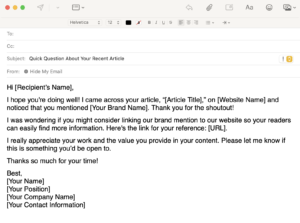
4. Follow up: Send a polite reminder if you don’t get a response.
5. Track results: Monitor new links and their impact on your traffic and SEO.
11. Get Listed on Local Business Directories
Local SEO is still important for ecommerce websites because you’re targeting customers where you deliver to so therefore you have localities and it becomes even more important if you have a brick-and-mortar store. Being listed on local business directories not only improves your local SEO but also provides quality backlinks.
Steps to implement:
- Identify local directories: Use Google to search for local business directories in your area.
- Submit your information: Make sure your business information is accurate and consistent across all directories.

12. Using Location-Based Domains
Location-based domains (e.g., .co.uk) can help you target specific geographical areas, making your business more relevant to local searchers.
- Link building with geo-specific websites: Seek out websites with location-based domains relevant to your business. For instance, if your business operates in New York, targeting .nyc websites can be advantageous.
- Geo-targeted content: Create content that specifically caters to local audiences. This could be a blog post about “Top Fitness Trends in New York” or “Best Places to Buy Organic Food in London.” Share this content with local bloggers and websites to secure backlinks.
- Localised anchor text: When securing backlinks from location-based domains, use anchor text that includes both your keyword and your location, such as “best fitness gear in New York.” This reinforces your relevance to local searches and can improve your ranking in local SERPs.
13. Targeting Websites with Local Traffic
Building backlinks from websites that cater to your local audience can significantly enhance your local SEO efforts. Of course, you want to lead people to your website who can actually purchase and benefit from your products.
Here’s how to go about it:
- Local directories and listings: Ensure your business is listed in local directories. These sites typically have high domain authority and cater to local traffic, making them valuable sources of backlinks.
- Local blogs and news sites: Reach out to local bloggers and news sites that cover your industry. Offer to contribute a guest post or be featured in an article. This can drive local traffic to your site while boosting your local SEO.
- Collaborate with local businesses: Similar to joint ventures, partner with local businesses for content collaborations. This could involve co-hosting an event, writing a joint blog post, or running a local promotion together. Ensure both parties link back to each other’s websites.
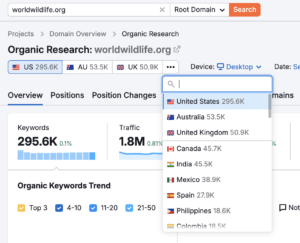
Common Link Building Mistakes to Avoid
Relying on Low-Quality Links
In the quest for backlinks, it might be tempting to go for quantity over quality, but this is a big no-no. Search engines like Google are getting smarter at sniffing out spammy links, and they’re not shy about dishing out penalties if they catch you engaging in dubious practices.
- The risk: Low-quality links typically come from sites with little to no authority, like spammy blogs, link farms (more on this later), or directories that have nothing to do with your niche. These links can hurt your rankings instead of helping them.
- The solution: Focus on earning links from reputable sites with strong domain authority. Aim for organic link-building methods like creating high-quality content, guest blogging on credible sites, and building relationships with influencers in your industry.
Ignoring Niche Relevance
A backlink is only as good as the site it’s coming from. If you’re getting links from websites that have nothing to do with your niche, you’re not doing your SEO any favours.
- The importance: Niche relevance is crucial because search engines use it to determine the value of a link. A link from a highly authoritative site in your industry carries more weight than one from an unrelated site.
- The strategy: Make sure your link-building efforts are targeted. Focus on securing links from websites that are relevant to your industry. For example, if you run an online pet store, getting a backlink from a reputable pet blog is far more valuable than a link from a general lifestyle site.
Overlooking the User Experience
Link building isn’t just about getting traffic to your site—it’s about ensuring that once people get there, they stay. If your site offers a poor user experience (UX), all those backlinks could be for nothing.
- The issue: A site with slow loading times, confusing navigation, or non-responsive design can turn visitors away in seconds, leading to high bounce rates. Not only does this negate the benefits of your link-building efforts, but it also sends negative signals to search engines.
- The fix: Before you ramp up your link-building campaign, make sure your site is user-friendly. Optimise page load times, simplify navigation and ensure your site is mobile-responsive. This way, when those backlinks start rolling in, they’ll lead to conversions, not just visits.
Failing to Monitor and Disavow Toxic Links
Even if you’re following best practices, toxic backlinks can still sneak into your profile. These are links from spammy or low-authority sites that can drag your SEO efforts down.
- The danger: Toxic links can lead to penalties from search engines, which can cause a significant drop in your rankings. It’s crucial to keep a close eye on your backlink profile and take action when necessary.
- The solution: Regularly audit your backlinks using tools like Google Search Console or third-party SEO platforms. If you find any toxic links, use Google’s Disavow Tool to tell search engines to ignore them. This proactive approach will help maintain your site’s health and authority.

Black Hat Techniques
While it might be tempting to take shortcuts, black hat techniques are a fast track to penalties that can severely damage your site’s credibility and rankings.
- Paying for links: Buying links is a risky game. Search engines are designed to detect and penalise paid links, so this tactic can easily backfire.
- Link farms: These are websites specifically created to house large quantities of outbound links. Participating in link farms is a sure way to get penalized by search engines, as it’s considered a manipulative practice.
- Ignoring no-follow links: While do-follow links pass on SEO value, no-follow links can still drive traffic and have an indirect positive impact on your rankings. Ignoring them altogether means missing out on potentially valuable opportunities.
Securing Your Ecommerce Success
The benefits of link building are clear: it boosts domain authority, drives organic traffic, enhances brand visibility, and generates valuable referral traffic. With the digital landscape evolving, having a robust link-building strategy is crucial for staying ahead of the competition and securing a prominent spot in search engine results.
To ensure your link-building efforts remain effective despite ongoing Google updates, focus on the following strategies:
- Quality over quantity: Emphasise earning high-quality, relevant backlinks rather than accumulating a large number of low-quality ones. Quality links from authoritative and relevant sites will have a lasting impact on your SEO.
- Stay updated with SEO trends: Keep track of changes in search engine algorithms and SEO best practices. This will help you adapt your strategies and maintain compliance with new guidelines.
- Diversify your tactics: Avoid putting all your eggs in one basket. Employ a mix of link-building strategies such as content marketing, outreach, and partnerships to create a well-rounded and resilient approach.
- Monitor and adjust: Regularly audit your backlink profile, track the effectiveness of your strategies, and be ready to adjust based on performance and new developments in SEO.
Ready to elevate your ecommerce SEO? Let our experts craft a winning link-building strategy tailored to your business needs. Contact us today to boost your domain authority, drive targeted traffic, and dominate search results. Reach out now and watch your online presence soar!



